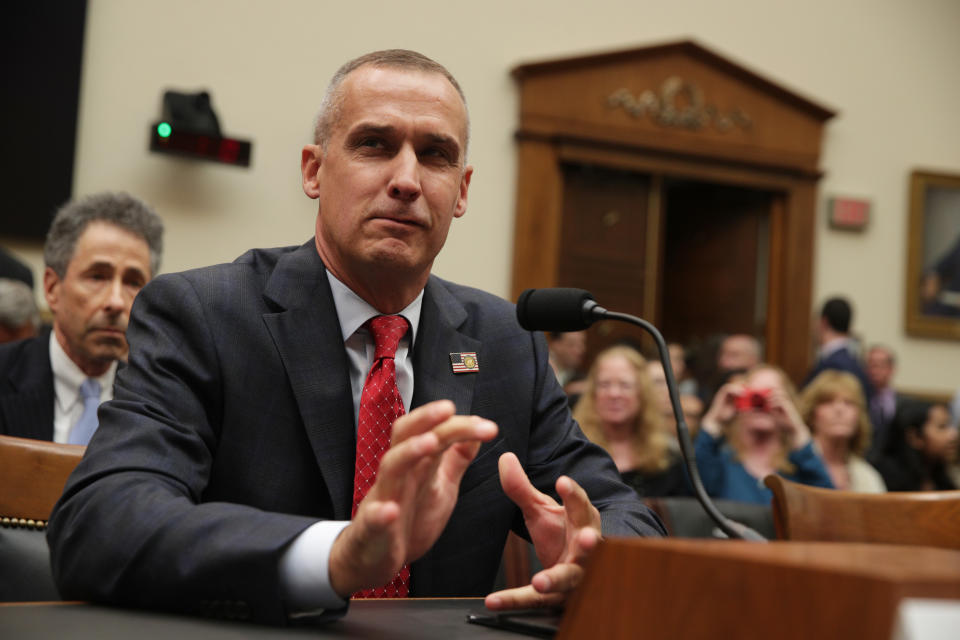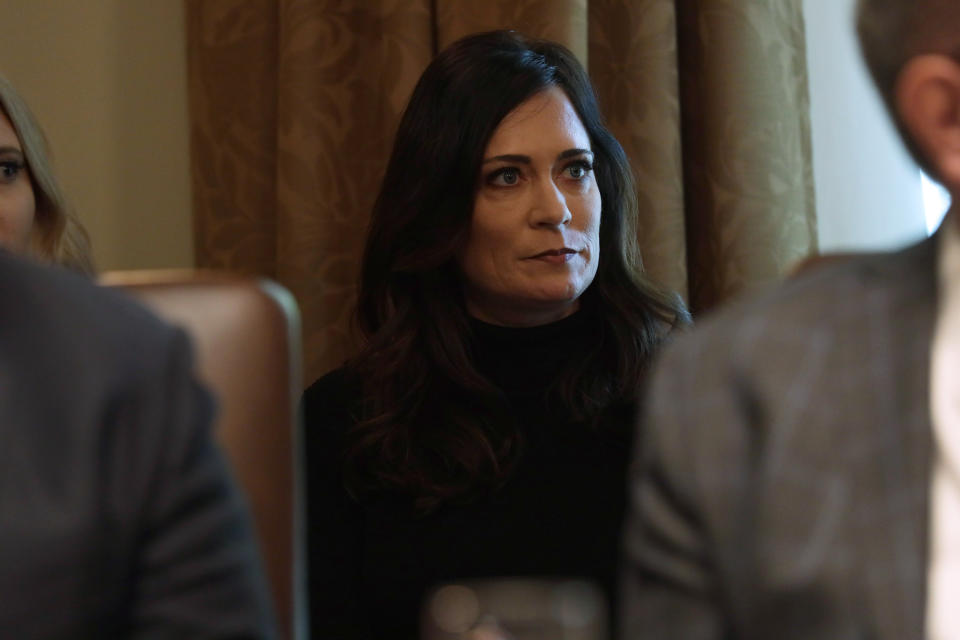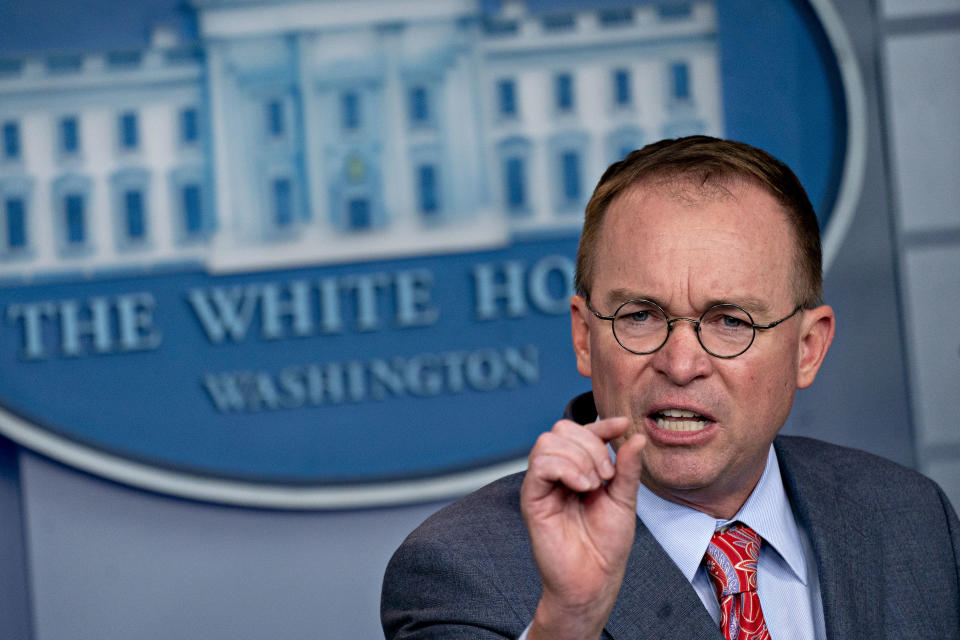Bannon to escalate Trump impeachment defense with his own political operation

WASHINGTON — Former White House chief strategist Steve Bannon is launching an increasingly aggressive defense of President Trump, promising to soon open a staffed “war room” that will forcefully counteract the fast-moving Democratic impeachment effort.
In an interview with Yahoo News, Bannon cited insufficient efforts on the president’s behalf by the Republican Party and the Trump administration itself to defend against an ongoing impeachment inquiry. He described his own efforts —which are still in the planning stages — as likely bearing the hallmarks of a traditional political operation: a “rapid response, messaging, surrogate program.”
The operation would have a “10-man staff” and take on many of the roles of a traditional war room.
“I’m gonna do polling,” he added. “I’m doing it.”
Encouraged by the reception of his recently launched “War Room: Impeachment” radio show, co-hosted by Raheem Kassam and Jason Miller, Bannon intends to carry his anti-impeachment message into the media mainstream.
“I don't see any intensity level,” Bannon lamented, speaking last Friday from the Capitol Hill townhouse where for years he has led a populist revolt, whether as the chief executive of Breitbart News or the chairman of the Trump presidential campaign in 2016.
“We’re not even in the heat of this thing yet,” Bannon warned. “The heat is about to come.”
To counter what he sees as a “master class” in “political warfare” now being waged by House Speaker Nancy Pelosi, who announced an impeachment inquiry into Trump’s dealings with Ukraine last month, Bannon intends to augment a daily broadcast with an actual war room — of the kind that the White House has thus far resisted implementing, opting instead for informal meetings by existing staff.

“We’re moving the sofa out, we’re changing the furniture,” Bannon said of the basement living area where, in lighter, pre-impeachment times, a junior aide might have been found playing video games on a large-screen television.
“He’s smart to take this fight on,” said a former White House official. “Fighting political battles like this is exactly what Steve Bannon was built to do."
Bannon would not say whom he planned to hire but admiringly spoke of longtime Trump loyalists like Corey Lewandowski, his first campaign manager; David Bossie, a personal and political associate; and Boris Epshteyn, a media adviser to Trump during the campaign and in the White House.
These figures, none of whom responded immediately for comment, all have current commitments. But they remain profoundly loyal to Trump and are already spending much of their time defending the president, albeit informally. Bannon did not say he planned to hire them explicitly, only that they could muster the pugnacity and outrage he was looking for. A spokeswoman for Bannon confirmed that a war room was in the works.
In his classic political dictionary, New York Times columnist William Safire defined a “war room” as a “command post for directing a military, political, or business campaign.” Safire dates modern usage of the term to 1992, when Hillary Clinton used it to describe her husband’s campaign operations in Little Rock, Ark. Bill Clinton later had an impeachment war room of his own. More recently, the Trump administration ran a war room during the Supreme Court confirmation process for Brett Kavanaugh, who had been accused of sexual assault.

Both of those were officially sanctioned operations, whereas Bannon’s will work independently of the White House. “I think the outside groups are probably the best to do this,” he told Brian Kilmeade in a Monday appearance on “Fox & Friends,” the president’s favorite morning news program.
The effort is not being coordinated with the White House. “I’m actually not aware of anything he’s working on,” White House press secretary and communications director Stephanie Grisham told Yahoo News. Grisham also said she was unaware of the criticisms Bannon had made of existing White House efforts to defend the president.
This would not be the first campaign in defense of Trump that Bannon has promised to launch. In late 2017, for example, he vowed to run primary challengers to Republican incumbents in the Senate, many of whom he charged with being disloyal to Trump. But his ambitions have sometimes outstripped his organizational capacity. The Senate challenge largely fizzled out with Roy Moore’s inauspicious campaign, in which Bannon played a central role.
Bannon subsequently engaged in a series of populist campaigns in Europe and Asia, which became the basis of a documentary, “The Brink.”
But the impeachment fight seems to play more to his strengths than, say, the Senate race in Alabama. There are no voters to register or candidates to coach, just a message to repeat over and over. Nor, as in the case of his campaign against China, are there complex geopolitical forces to overcome.

It will be a game of catch-up, as Bannon knows, because Democrats have largely defined impeachment on their own terms. Accordingly, public support for impeaching Trump has risen.
Speaking after a taping of “War Room” during which he showered praise on Rep. Matt Gaetz, R-Fla., for his aggressive defense of Trump, Bannon said he admired the simplicity of Democrats’ message, which he described as: “Orange man bad.”
It was time, he said, that Trump’s allies came up with a similarly compelling message.
“This is not a search for truth,” he said of the impeachment process, which Pelosi delegated to Rep. Adam Schiff, a former prosecutor who heads the House Intelligence Committee. “This is highly sophisticated political warfare — and a massive disinformation campaign that the Democrats are quite smartly running,” Bannon said. He repeatedly praised Pelosi, lauding her skills of political organization and maneuvering.
Republicans, in his estimation, have not been so strategic or smart. Bannon said he was dismayed by the press conference that acting White House chief of staff Mick Mulvaney gave earlier this month, in which he offered a defense of Trump that was widely seen as damaging and confusing.
“I was not comfortable when I saw Mick up there,” Bannon said. “He tried to wing it. You can’t wing this.” He said that a cleanup interview Mulvaney gave to Chris Wallace of Fox News hardly helped. Nor was he particularly pleased by Sen. Lindsey Graham’s announcement of a resolution condemning the House impeachment inquiry. Although Senate Majority Leader Mitch McConnell co-sponsored the resolution, and more than 40 other Republican senators endorsed it, none stood at the podium with Graham.
“That's not good symbolism,” said Bannon, aware as ever of how images can inform public opinion more than arguments. The image of Graham flipping through amateurishly designed posters, sure enough, became the kind of Twitter fodder the anti-impeachment forces will need to avoid if they hope to sway Americans to their side.
Bannon is ramping up his own efforts in part because he has come to believe that some Republicans are willing to save Trump only if he makes concessions to the party on issues like immigration and trade. “They want to see the end of the Trump presidency and the beginning of a Republican presidency,” Bannon said of mainstream Republicans.
“I think they’ve had enough of Trump.”
_____
Download the Yahoo News app to customize your experience.
Read more from Yahoo News:



